|
|
|
Sort Order |
|
|
|
Items / Page
|
|
|
|
|
|
|
| Srl | Item |
| 1 |
ID:
098372
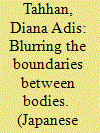

|
|
|
|
|
| Publication |
2010.
|
| Summary/Abstract |
Touch, as it is conventionally conceived, appears to be lacking in everyday Japanese intimate relationships, which are accordingly commonly characterised in terms of subtle non-tactile and non-verbal forms of communication; feelings are expected to be inferred. However, it is unclear as to how such forms manifest feelings of closeness in the first place. This paper explores the embodied experience in the intimate spaces of the Japanese family. Japanese parent-child relationships help us to become acquainted with different ways of understanding bodily intimacy and touch. The paper explores the cultural meaning of touch in Japanese bodily intimacy, particularly where the child is under five years old, and presents an embodied and sensuous understanding of the touch which informs parent-child relationships as the child grows older. Certain phenomenological tools are used helping to develop the notion of a blurring of the boundaries between bodies in Japanese bodily intimacy.
|
|
|
|
|
|
|
|
|
|
|
|
|
|
|
|
| 2 |
ID:
158426
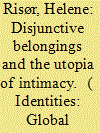

|
|
|
|
|
| Summary/Abstract |
The paper analyses practices of intimacy among youth in a poor, crime-ridden neighbourhood of Santiago. It argues that their sense of belonging to their neighbourhood and broader society is disjunctive: they inhabit the nation-state without complying with expectations of proper citizenship. Similarly, they dwell in their neighbourhood without identifying with it. Instead, they turn to intimate relations with friends and lovers as spaces of belonging. Through these often failing relationships, they pursue emotional and socio-economic stability and seek to fulfil expectations of social becoming and mobility. These intimate and romantic practices can both be understood as an utopian, affective promise that allows for imagining possibilities of a good life and as a moral exercise in the realisation of an adjacent self and we argue that intimacy constitutes a key site in the quest for social belonging among subaltern youth in neoliberal Chile.
|
|
|
|
|
|
|
|
|
|
|
|
|
|
|
|
| 3 |
ID:
160102
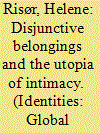

|
|
|
|
|
| Summary/Abstract |
The paper analyses practices of intimacy among youth in a poor, crime-ridden neighbourhood of Santiago. It argues that their sense of belonging to their neighbourhood and broader society is disjunctive: they inhabit the nation-state without complying with expectations of proper citizenship. Similarly, they dwell in their neighbourhood without identifying with it. Instead, they turn to intimate relations with friends and lovers as spaces of belonging. Through these often failing relationships, they pursue emotional and socio-economic stability and seek to fulfil expectations of social becoming and mobility. These intimate and romantic practices can both be understood as an utopian, affective promise that allows for imagining possibilities of a good life and as a moral exercise in the realisation of an adjacent self and we argue that intimacy constitutes a key site in the quest for social belonging among subaltern youth in neoliberal Chile.
|
|
|
|
|
|
|
|
|
|
|
|
|
|
|
|
| 4 |
ID:
098373


|
|
|
|
|
| Publication |
2010.
|
| Summary/Abstract |
This article examines the creation of entrepreneurial male subjects in Japan's host clubs. Based on my ethnographic study, I argue that hosts' entrepreneurship is constituted by commodifying themselves. This paradoxical - commodified, yet entrepreneurial - male subject is embedded in the new possibilities and constraints posed by Japan's neoliberal restructuring and global economic trends. Hosts, who dream of earning fast cash and achieving upward class mobility, perceive the hosting business as a gateway to success, fame, and luxurious lifestyles. As a result, they 'voluntarily' commodify themselves and feed into the club's profit-making. They are also exploiting the consumer logic of desirability and the neoliberal values of entrepreneurship. By doing so, they hope to better position themselves in contrast to the work ethic and status of Japan's conventionally hegemonic masculine icon, the Salaryman. I contend that neoliberal reform in Japan is not a mere politico-economic reaction to globalization, but a socio-historically specific situation in which individual desires, Japan's social values and ethics, and global economic trends discursively intersect, align, and produce a new mode of attachment to individual freedom and flexible accumulation of capital.
|
|
|
|
|
|
|
|
|
|
|
|
|
|
|
|
| 5 |
ID:
177889


|
|
|
|
|
| Summary/Abstract |
This special issue investigates citizenship and belonging in mixed-status families, i.e. families consisting of both citizens and non-citizens. We critique the standard perception of citizenship as ‘hard on the outside and soft on the inside’. For citizens with non-citizen family members, the exclusionary nature of citizenship is very much ‘inside’, in the very heart of their families. We deploy the concept of ‘performing intimate citizenship’ to understand how citizens deal with migration regulations that hinder them from living with their families. Often this is a first, shocking confrontation with state intervention into their private lives. Protesting such interventions – in court, in collective mobilisation, in letters to the authorities – involves making claims both about who belongs and about what ‘proper’ family is. Thus, citizens and their non-citizen family members ‘perform intimate citizenship’: they express what citizenship is and should be, by mobilising intersecting conceptions of intimacy and of belonging.
|
|
|
|
|
|
|
|
|
|
|
|
|
|
|
|
| 6 |
ID:
172341


|
|
|
|
|
| Summary/Abstract |
This article proposes a method for analysing museums as sites of intimate and colonially-produced international relations. Beginning with fieldwork that approaches museums as sites through which people intimately encounter the objects, institutions, selves and others of international politics, we explore how intimacy can be ‘read’ as socio-sexual affect, scales and proximities, and colonial differentiation/racialisation. The article is grounded in fieldwork at the British Army Royal Engineers Museum in Kent, UK, conceptualised as an assembly of, following Stoler, imperial debris. We explore how certain museum exhibits work as intimate ‘organising objects’, locating the museum collection, and those who visit or are excluded from it, within the intimate circulations of imperial and colonial violence. The article makes two core contributions: first, responding to recent literature in IR on museums we propose a framework for understanding how museums and exhibitions function as everyday sites of coloniality and racialisation. Second, we propose that approaching intimacy as a method is instructive for fieldwork in international relations (including museums) which takes the colonial constitution of the global/local seriously.
|
|
|
|
|
|
|
|
|
|
|
|
|
|
|
|
| 7 |
ID:
144365
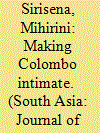

|
|
|
|
|
| Summary/Abstract |
This paper discusses the significance of considering the relationship of urban space to affective intimacy. I consider the modes through which migrant students attending the University of Colombo experience Sri Lanka's capital city. Focusing on romantic relationships, I argue that the city presents a relational space that can be transformed through quotidian intimate experiences. Students inhabit and re-orient a potentially isolating and alienating space with emotionally-inflected interactions, routines and memories. Drawing from ethnographic fieldwork conducted with students at the university in 2007–08, this paper argues that building an affectionate and living relationship with the city is a way of ‘intimatising’ it.
|
|
|
|
|
|
|
|
|
|
|
|
|
|
|
|
| 8 |
ID:
141050
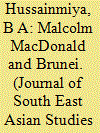

|
|
|
|
|
| Summary/Abstract |
This article narrates the long-standing diplomatic relationship between Malcolm MacDonald and Brunei. Macdonald played a significant role in safeguarding Brunei's survival as an independent Malay Islamic sultanate during decolonisation. He prevented Brunei from becoming a British crown colony in 1946 unlike the neighbouring states of Sarawak and North Borneo. Having failed to unite the three North Borneo territories into a federation, he may have concurred with Brunei's decision to opt out of the Malaysian Federation in August 1963 and thereafter. Due to his empathy with the Brunei sultans, especially Omar Ali Saifuddin the III, MacDonald's approach for Brunei's future contradicted the vision of his contemporaries for democratising Brunei.
|
|
|
|
|
|
|
|
|
|
|
|
|
|
|
|
| 9 |
ID:
117886
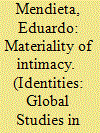

|
|
|
|
|
| Publication |
2013.
|
| Summary/Abstract |
Ash Amin's Land of Strangers (2012) is analysed in terms of how it contributes to an understanding of the materiality of intimacy by looking at toilets. Toilets are analysed in terms of their 'thingy' character, but also how they are philosophical tools that encrypt a whole raft of social relations and ideologies. This is then related to what is here called Amin's somatic dialogical cosmopolitanism.
|
|
|
|
|
|
|
|
|
|
|
|
|
|
|
|
| 10 |
ID:
155075
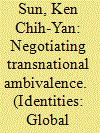

|
|
|
|
|
| Summary/Abstract |
This article uses older parents of parachute kids as an example to explore the ways in which the heads of transnational households assess intergenerational intimacy at a later stage of their life trajectories. I argue that transitioning to a later life stage motivates or even demands older parents reorient their perspectives on the separation from their children overseas. Specifically, I offer the concept of transnational ambivalence to analyse the processes whereby older parents grapple with the meaning of being physically separated from their children. This study demonstrates how the interplay between extended family separation and human ageing provokes complex feelings and emotions among parents. In addition, this research chronicles the factors that explain the variation in parental ambivalence. In so doing, this article contributes to the literature on transnational families by illuminating the temporal reflexivity of parents ‘left behind’.
|
|
|
|
|
|
|
|
|
|
|
|
|
|
|
|
| 11 |
ID:
175564
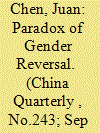

|
|
|
|
|
| Summary/Abstract |
This study examines the masculinity of Chinese male migrants who earn their living as “dance hosts.” Dance hosts partner middle-aged women in dance halls, sell experiences of intimacy and engage in ongoing romantic relationships with their female clients. This article seeks to capture an intimate and “up-close” portrait of (heterosexual) male dance hosting, and then further addresses dance hosts’ masculine subjectivity by examining the coping strategies they use to overcome the stigma attached to their profession and to assert their masculinity. Ultimately, the article argues that the process of masculine subjectivity formation in the case of male dance hosts is structured by dominant norms of Chinese masculinity. Although seemingly highly subversive, the relationship between dance hosts and clients in fact fulfils conventional gender ideals and encourages the perpetuation of traditional gender roles in China's patriarchal society. This work seeks to offer an understanding of traditional gender norms (or ideals) through the lens of normative Chinese masculinity within the context of a stigmatized occupation.
|
|
|
|
|
|
|
|
|
|
|
|
|
|
|
|
| 12 |
ID:
144761
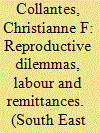

|
|
|
|
|
| Summary/Abstract |
This paper explores the reproductive dilemmas of individuals from a communal compound in Cavite, which are impacted by the complicated intersection of economic globalization and prescriptions of gendered performances and spatialities. Specifically, it looks at how remittances from overseas Filipino worker (OFW) relatives and the personal desires for overseas mobility directly shape these individuals' decisions regarding reproduction, relationships and intimacies. Wilson's (2004) concept of intimate economies helps to frame and theoretically encase the ongoing dialogue between global labour economies and personal intimacies related to reproduction and family planning. Ethnographic data and narratives were collected while the Philippines' Reproductive Health Law (commonly known as the RH Law) was being passed in December 2012. As it mandates public access to reproductive health services including artificial contraceptives, sex education and maternal care, the RH Law continues to face strong opposition from leaders of the Philippine Catholic Church and formidable 'Anti-RH' movements (approximately 81% of Filipinos identify themselves as Roman Catholic). This article highlights how reproductive dilemmas are dictated not only by religious beliefs and practices, but also by gendered and economic arrangements against a backdrop that is both politically polemical and rapidly globalizing.
|
|
|
|
|
|
|
|
|
|
|
|
|
|
|
|
| 13 |
ID:
104169
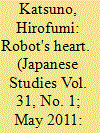

|
|
|
|
|
| Publication |
2011.
|
| Summary/Abstract |
This paper explores the processes by which humanoid robots become sites of affective investment in contemporary Japan. It particularly analyses how narratives of intimacy, conventionally found in relationships between humans, are being reproduced and embodied in interactions with humanoid robots. It uses ethnographic research on participants in Robo-One, one of Japan's most popular robotics events, to examine the development of intimate relationships between the human and the robotic, understood in terms of kokoro (loosely translated as 'heart'). The robot's heart emerges in the grey area between technological material and human imagination. Through the respective processes of tinkering and spectating, both robot builders and 'robot watchers' experience the intimacy that results from apprehending the robot's heart. This experience creates an endless hermeneutic circle, drawing together subject and object, original and copy, creator and created, and watcher and watched, to ultimately reconfigure participants' senses of their own kokoro.
|
|
|
|
|
|
|
|
|
|
|
|
|
|
|
|
| 14 |
ID:
190683


|
|
|
|
|
| Summary/Abstract |
This article contributes to studies on youth in Turkey by exploring gender, sexuality, intimacy, and relationship practices among college students. Our findings show that there is change (a) towards greater gender equality; (b) about attitudes regarding family, sexuality, and romance; and (c) in understanding and experiencing gendered violence in the groups of students we examined. Progressive values appear to become more common among the participants despite the increasingly conservative tone of the political and cultural climate. However, traditional relationship patterns and norms, including the idealization of monogamous relationships, robust familial ties, and sensitivity for moral reputation, seem prevalent even though these were not associated with the ascendant politico-religious conservatism. By constituting ‘secular but conservative’ intimate selves and relations, our respondents approve the freedom and right to explore possibilities for others, and yet not immediately for themselves, as they preserve an unequivocal moral self.
|
|
|
|
|
|
|
|
|
|
|
|
|
|
|
|
| 15 |
ID:
165898
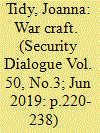

|
|
|
|
|
| Summary/Abstract |
This article makes the case for examining war from what Stephanie Bunn calls a ‘making point of view’. Makers and their material production of and for war have been neglected in our accounts of war, security and international relations. An attention to processes of making for war can reveal important things about how such processes are lived and undertaken at the level of the body. The article focuses on the particular phenomena of martial craft labour – the recreational making of ‘stuff’, including hats and pillowcases, by civilians for soldiers. To explore embodiment within this social site, an ethnographic method is outlined that enables the reading of objects as embodied texts, the observation of others in processes of making, and the undertaking of making by the researcher. Analysing embodied registers of aesthetic expression and the social values that attend such crafting for war reveals how this making is a space through which intimate embodied, emotional circulations undertake work for liberal-state and military-institutional logics and objectives, obscure violence, normalize war, and produce the military as an abstract social cause. Beyond the immediate empirical focus of this article, a much wider political entanglement of violence, embodiment and material production necessitates a concerted research agenda.
|
|
|
|
|
|
|
|
|
|
|
|
|
|
|
|
|
|
|
|
|